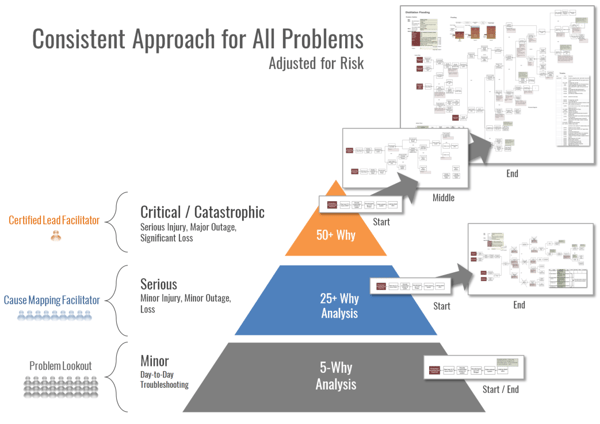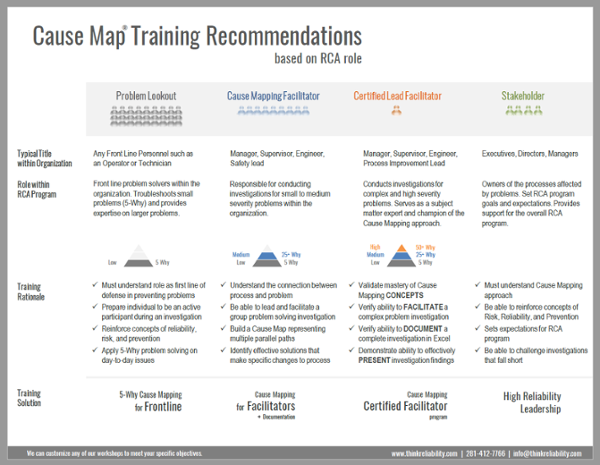Everyone in your organization plays a role when it comes to solving and preventing problems. People are constantly responding to challenges and obstacles as they execute the processes that drive your business. The majority of problems that people troubleshoot and solve are small, low risk issues that occur daily. These problems are resolved on the front lines and are rarely reported.
Sometimes, however, problems explode into something much larger, getting immediate attention, thus triggering a formal root cause analysis (RCA). While these high severity problems will demand an in-depth analysis, there is also value analyzing those smaller problems that are often overlooked.
Heinz Bloch once stated that he’s never seen a problem that didn’t announce itself first. The implication is that there are typically many warning signs preceding a catastrophic incident. A lot of these warnings are the small day-to-day incidents that go unnoticed and often unresolved. Imagine if we were able to learn from these small problems and implement preventative solutions that ultimately prevent catastrophic incidents before they occur.
Interestingly, that is exactly the approach of high reliability organizations (HROs). HROs are extremely interested in learning from their problems. They are preoccupied with failures, large ones but mostly small ones. The key to learning from these problems requires involvement from the people closest to the task within your organization. They serve as “problem lookouts” if given the opportunity, training, and avenue to report their findings.
So, to answer the question posed at the beginning of this article… Everyone can benefit from some form of problem-solving training. Not only does it provide the skills to solve problems, it also promotes a consistent problem-solving approach that helps drive a prevention culture across your organization and sets the stage for achieving high reliability.
Choose Your RCA Approach Wisely
Training, however, should not be a one size fits all. While there are foundational concepts and principles that must be learned and understood at all levels, the training course should be designed based on the different problem-solving roles and expectations. In addition, the problem-solving method that you choose to follow will also play a significant role in your training program.
I would be cautious of any approach that overcomplicates problem solving efforts by using methods that require memorizing special terminology, referencing proprietary templates, and/or relying on a table of predefined cause codes that will magically identify your root cause.
Instead, a principle-based approached founded on cause-and-effect validated with evidence can thoroughly explain and solve any problem you have. Fundamental cause-and-effect can be used to explain and solve large or small problems, you only need to adjust the level of detail (explanation) and amount of supporting evidence. This provides a tremendous problem-solving advantage. One method can be taught across the organization ensuring a consistent problem-solving language and message.
Training Based on RCA Role
With a principle-based approach you are able to capture the analysis at an appropriate level of detail to address the risk to your organization. This also keeps the focus of your investigation on the details of your problem instead of the tool being used. The graphic in below shows three different thresholds (some organizations use four) that would be defined by your organization.
The graphic illustrates the expected level of analysis needed based on the overall impact or risk. Naturally, the higher the risk, the more opportunities we will want to reveal in order to prevent recurrence. Notice that regardless of severity, every analysis begins as a basic 5-Why and then expands to an appropriate level of detail to reveal solutions.
The 5-Why as a foundation for every investigation ensures a consistent problem-solving approach for everyone. With a consistent approach, you can adjust the level of training required to the expected level of detail for the RCA role.
- A Problem Lookout (front line problem solver) should be able to build a 5-Why on small problems as well as understand basic troubleshooting skills.
- Someone responsible for investigating a higher severity problem must learn how to expand on the 5-Why baseline as well as learn how to lead and facilitate a group problem solving effort. This will require more extensive training and practice.
- Someone investigating a high severity problem should have training and experience to facilitate and lead a large investigation. Given the severity, a validation of skills is recommended.
- Stakeholders and process owners will even benefit greatly from an understanding of fundamental concepts that serve as the foundation of problem-solving program.
The PDF below offers a comparison of the training solutions proposed for the roles highlighted above. It provides the rationale for the recommended training within your organization along with our recommended workshops for each role:
- 5-Why Cause Mapping for Frontline
- Cause Mapping for Facilitators + Documentation
- Cause Mapping Certified Facilitator Program
- High Reliability Leadership
If you have any questions about our workshops, more information can be found on our workshop page. I would also be happy to discuss the different courses that we offer along with how we can even customize the content to meet the specific needs of your RCA efforts. To schedule time to talk, you can email me at aaron.cross@thinkreliability.com.
We will also be exploring, "What's Missing in your Root Cause Analysis Program?" in this week's FREE, live webinar. Learn more about the five basic elements for establishing a comprehensive root cause analysis program: the method; measurements; roles in the investigation process; facilitation, documentation & storage; and review of the entire program. Register today!













